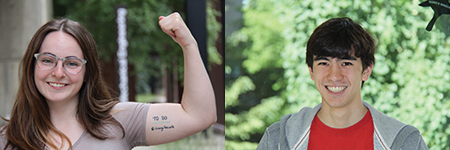
Researcher Janine Schmitke, left, has a tattoo of her complete to-do list: "Change the world." Marcus Tamura, right, is a seasoned researcher despite being an undergrad.
MARCUS TAMURA: I'm in engineering physics with a nano option and a co-op option, going into third year. This is my second summer with an NSERC undergraduate grant. I'm working on the same project as last year, but I am doing slightly different work this year. The first summer I was in the lab and I was doing a lot of testing. We're working on an impedance-based biosensor, so I was doing a lot of the impedance tests.
You know how wood is less conductive than metal? This is just be inverse of that. It's what we call a single sandwich assay. It's where we basically take this surface and we bind antibodies to it and then add proteins in different concentrations. We use these gold nanoparticles that are modified with different antibodies to bind to the proteins really effectively. That creates an impedance change in the surface. The proteins alone will create a slight change on the surface, but the gold nanoparticles enhance the signal.
And basically we detect that impedance change to be able to detect the amount of proteins that are in the solution that we put on the chip. The goal is to detect different biomarkers in hopes we can develop diagnostic tools around the process.
We're also doing some spore tests, too. Last Thursday I was in a Vegreville doing a demo because farmers in the area are interested in finding ways to detect the spores that create disease in canola plants, so they can treat them before the disease impacts the crops.
The systems we are working towards are small and affordable and hopefully will be able to deliver diagnosis at point-of-care, rather than sending samples to the lab. We are not there yet, but the work is underway. The research was generated by Dr. Chen and his grad students. They saw the need and they really developed the approach.
It's good exposure for me as an undergrad to be able to see and participate in this kind of research. I am in engineering, not science, and so it's more device- and application-oriented. It's good to see how I can do research as an engineer.
JANINE SCHMITKE: I just got into second year chemical co-op. I was interested in the biomedical option but it didn't run this year. I'll be taking as many of those classes as possible as I progress in my degree.
For the NSERC grant I am working in Dr. Uludag's lab. His lab is working on gene therapy to find ways to treat breast cancer and leukemia and couple other immune system diseases. So its aim is to identify less harmful ways to treat cancers.
My interest lies in biomedical engineering, so I emailed Dr. Uludag and said, "I hear you're up to some pretty cool stuff." We met in early January and he suggested I apply for the NSERC undergraduate grant, and I got it! Right now I'm working with a PhD student. I do a lot of the experiments for her, getting a lot of hands-on experience. It has been great working with both of them. I think Dr. Uludag appreciates that, at one time, someone took a chance on him and now he's doing the same thing. He's very willing to pass it on.
What I'm doing is called gel-electrophoresis. You make this kind of gel and put DNA in it. Then you add electricity and the DNA moves. The distance depends on what size the particle is and how positive it is. It's a really, really cool opportunity.
Later in my life I would like to do tissue engineering; that's a long-term goal and this research is a step towards it. I know the technology is changing so fast. I hear about people 3D printing ears and stuff. That's what I'd like to be part of.
It's hard to imagine doing research while you're in first year. By then end of first year I started figuring out how to meld a social life with intense studying-it's really competitive to get into the program you want. But I started climbing at the Wilson Centre and it's a nice break. This school year I'm hoping to volunteer with the sustainability office.
Next summer I'd like to try some more research. I want to try a little bit of everything!